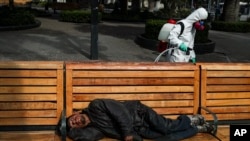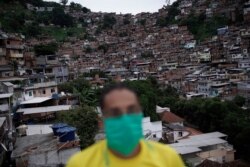Former U.S. President Jimmy Carter and U.S. billionaire Bill Gates have joined the chorus of those expressing concern about U.S. President Donald Trump’s decision to suspend U.S. funding for the World Health Organization.
Carter, a Democrat, issued a statement Wednesday saying the United Nations agency “is the only international organization capable of leading the effort to control this virus.” He said he was “distressed” by the decision to withhold critically needed U.S. funding during an international epidemic.
Gates, who is a major funder of the WHO, said the decision was "as dangerous as it sounds."
The United Nations and many leaders have criticized Trump’s timing for cutting the funds when they are most needed.
The U.S. is the world’s largest contributor to the WHO, with its more than $400 million contribution in 2019, amounting to about 15 percent of the organization’s budget.
Trump accused the Geneva-based organization Tuesday of failing to obtain independent reports about the coronavirus originating from China’s central city of Wuhan and relying instead on China’s official reports. Beijing officials initially tried to downplay the dangers of the new strain of coronavirus. Trump said the funding will be suspended pending an investigation into the WHO’s handling of the outbreak.
The United States is now the worst-hit country with more than 637,000 confirmed COVID-19 cases as of Wednesday evening, out of more than 2 million infected people worldwide, according to the Johns Hopkins University Coronavirus Resource Center. Critics have blamed Trump for waiting too long to act, and some say he is now looking to shift the blame to China and the WHO.
Returning to normal
Meanwhile, all eyes are on coronavirus daily tolls as leaders try to determine how soon people's lives can return to normal. Denmark is the first European country to reopen its schools, but students are seated at a distance from one another and have to follow a strict hygienic protocol. Several other European countries are planning to reopen schools and businesses in the coming weeks.
The U.S. president is eager to restart the economy as soon as possible, but health officials and many state governors agree that the hoped-for date of May 1 would be too soon and could lead to a new wave of infections.
California Governor Gavin Newsom said he would consider lifting lockdown orders only when the number of hospitalizations declines for at least two weeks. He also wants more widespread testing so officials have a better ability to track and isolate those who are infected, and he wants more protective gear for health care workers.
The economy is a big worry for all, especially after the IMF said Tuesday that the world would be hit this year by the worst economic depression since 1930.
Leaders of the G-20 industrialized nations have decided to put a partial moratorium on debt payments this year from the world’s developing countries. Many of them are in Africa, where the coronavirus has not spread as much as in Europe and the United States. But the number of new cases is creeping up, forcing leaders to impose protective measures.
Russian President Vladimir Putin announced Wednesday that small and medium-size companies in his country would receive financial aid of $162 per employee if they had preserved at least 90 percent of staff as of April 1.
In New Zealand, Prime Minister Jacinda Ardern announced she and other top officials were voluntarily cutting their salaries by 20 percent in a symbolic move acknowledging the country’s economic hardships in response to the outbreak.
The British Home Office reported Wednesday that border police had found more than $1.25 million worth of cocaine in a shipment of protective masks in a truck at the Channel Tunnel.







